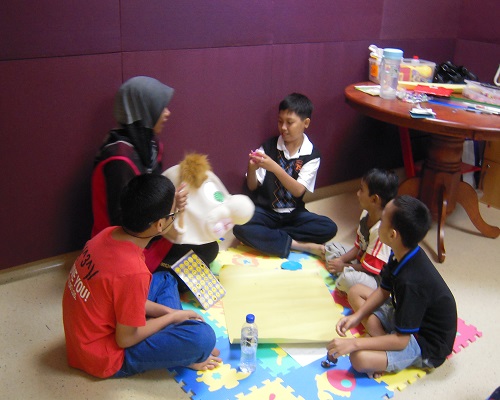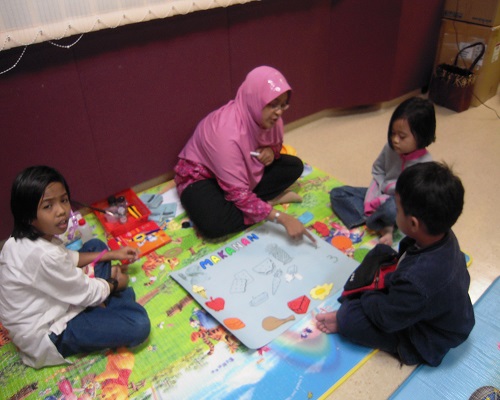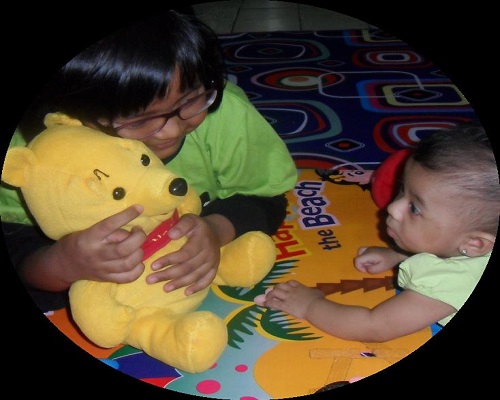I want my child to talk!!!
I want my child to communicate!!!
Parents always want their children to be able to talk, follow commands and answer questions. However, in reality, before a child could able to do all that, s/he needs to acquire preverbal skill.
Preverbal Skill
Could we build a house without strong scaffolds? Definitely, NOT. Like building a house, speech and language skills are very complex and require support from other skills especially preverbal skill.
A child usually starts to learn preverbal skill from birth until three years old. This skill is very important for further speech and language development. Early preverbal skill acquisition marks good speech andlanguage skills at later age.
Preverbal skill consists of:
-
Eye contact
Eye contact happens when a child looks at the parents or other person’s eyes. Eye contact is one of the indicators that tell us that child is ready to talk.
-
Attention
Able to respond to name call, pay attention during play and looking at moving objects are some of the characteristics of good attention skill. Child usually learns better when s/he is able to pay attention.
-
Take turns
Take turns is very important for speech and language development. This skill helps child to share things with others. Besides that, it gives child to take turns in communication.
-
Since birth to three years old, child imitates a lot of sounds, actions and words that are used by parents. This skill helps children to understand and use speech in daily routine.
-
Play skills
Play is very important and helps a lot in term of children’s speech and language development. Through play, children are expose to new experience. Sharing and talking happen during play help children to master speech and language level much better.
-
Matching similar objects and pictures
Matching similar items (object to object; picture to picture) is a basic skill requires for learning speech and language. It also helps in reading, writing and calculation skills when children reach school age.
-
Sitting tolerance
Able to sit still during activity is very crucial for child to learn speech and language. Good sitting skill helps child to pay attention to activity. Child who is not able to sit still or hyperactive is usually hard to interact with.



Preverbal Skill Training
There are many activities that parents could use to train or facilitate child’s preverbal skill. Some of the activities are as below:
- Requesting with eye contact
Use child’s preferred toys. Place toy at your eye level. Wait for child to look at your eyes and give her/him the toy once s/he looks at you. - Give choices
Give two choices of toys to child. For example, “Do you want car or ball?” Place the toy at your eye level. Give it to your child once the look into your eyes. - Use appropriate items
Use any suitable items like mirror to encourage child to look at your eyes.
Attention
- Position
Positioning is very important in teaching or facilitating child to make eye contact and pay attention. Make sure to sit in front of your child and make sure the pay attention at you. - Attract your child’s attention
Attract your child’s attention by holding her/his shoulder when you want to talk to her/him. This will help the child to pay attention at you. - Avoid distraction
Use a quiet room to make sure there is no distraction. Do one activity at a time. Do not give many toys at the same time.
Take turns
- Use appropriate toys
Use toys like ball, puzzle and car. Train child to take turns to throw ball, arrange puzzle or push toy car. - Give cues
Always remind child about turns. Use phrases like, “My turn”, “your turn”, “mama’s turn”, “papa’s turn”. - Short waiting time
Make sure ‘waiting time’ for child’s turn is short especially during early training session. Child might snatch the toys if the waiting time is long.
Imitate action, sound and word
- Choose appropriate activity
Conduct fun activities like singing or dancing activity to encourage child to imitate actions, sounds and words. - Use doll
Most of children give good responses when play with doll. Make appropriate actions and encourage child to imitate.
Play
- Play with your child
Don’t let your child to play alone. Parents should play with their children, so that children will know how to play appropriately. There is also great opportunity for children to learn speech and language skills when playing with parents. - Choose age appropriate toys
Parents should have some knowledge on choosing appropriate toys for their children age. Good toys choices help children learn suitable with their brain development. - Fun and attractive
Children love fun and attractive activity. Good activity helps to develop and maintain child’s attention.
Matching object or picture
- Appropriate items
Prepare a set of same objects and pictures. For example, two red apples, two blue balls and 2 pictures of black shoe. Teach child to match the object or picture with its pair (red apple – red apple; blue ball – blue ball; black shoe – black shoe).
Sitting tolerance
- Fun activity
Play with fun toys to attract child’s attention. Select toys which are age appropriate for your child. This is important to help child to sit still and pay attention during activity.
Good preverbal skills help to boost child’s speech and language skills development. Parents play an important role in helping the child to learn and acquire the skills appropriate for their development.
Resources:
- Bee, H., & Boyd, D. (2004). The Developing Child. (10th Ed.). United States; Pearson Education, Inc.
- Paul, R. (2001). Language Disorders From Infancy Through Adolescence. (2nd Ed.) United States; Mosby, Inc.
- Lynch, C., & Cooper, J. (1991). Early Communication Skills Practical Activities For Teachers and Therapist. Blcester; Winslow Press.
| Semakan Akhir | : | 28 Ogos 2020 |
| Penulis / Penterjemah | : | Rozila bt. Sumardi |
| Akreditor | : | Zaidi bin Ya’acob |
| Penyemak | : | Nadwah bt. Onwi |







